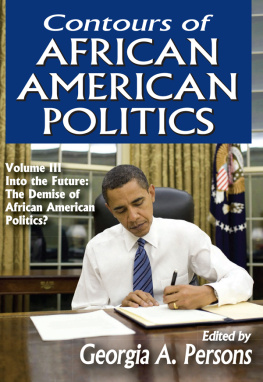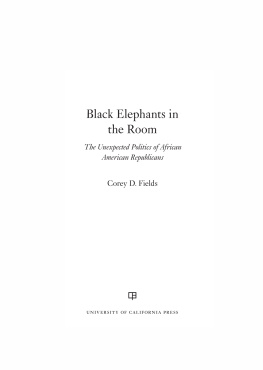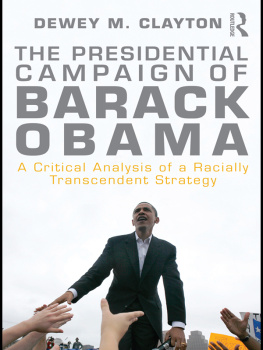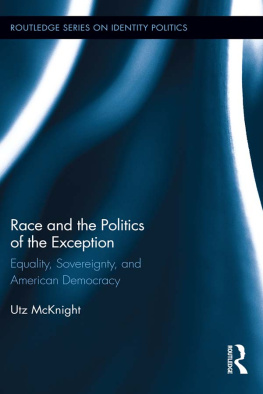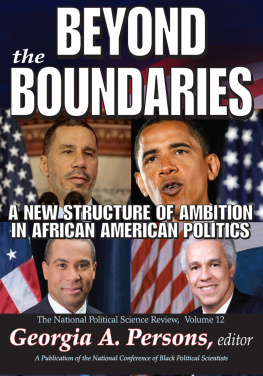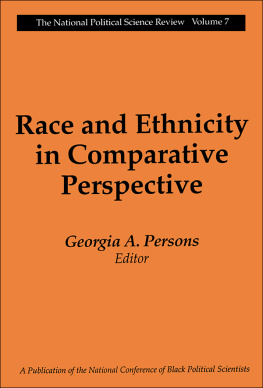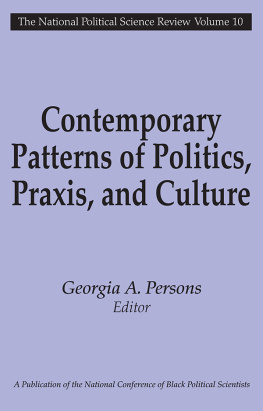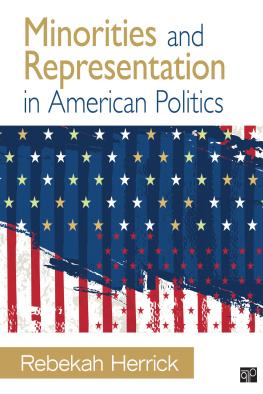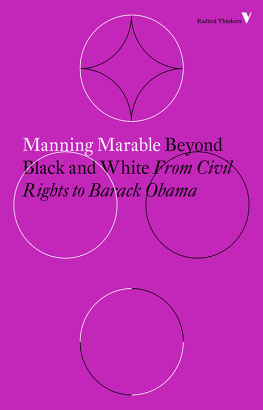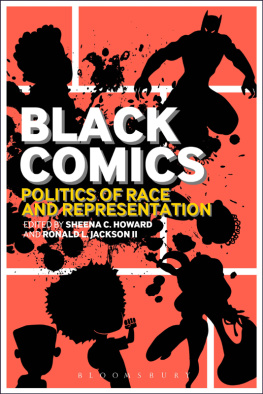First published 2014 by Transaction Publishers
Published 2017 by Routledge
2 Park Square, Milton Park, Abingdon, Oxon OX14 4RN
711 Third Avenue, New York, NY 10017, USA
Routledge is an imprint of the Taylor & Francis Group, an informa business
Copyright 2014 by Taylor & Francis.
All rights reserved. No part of this book may be reprinted or reproduced or utilised in any form or by any electronic, mechanical, or other means, now known or hereafter invented, including photocopying and recording, or in any information storage or retrieval system, without permission in writing from the publishers.
Notice:
Product or corporate names may be trademarks or registered trademarks, and are used only for identification and explanation without intent to infringe.
Library of Congress Catalog Number: 2012007989
Library of Congress Cataloging-in-Publication Data
Contours of African American politics / Georgia A. Persons, editor.
v. cm.
An anthology of articles drawn from prior issues of the National Political Science Review.
Contents: v. 1. Race and representation in American politics -- v. 2. Black politics and the dynamics of social change -- v. 3. Into the future: the demise of African American politics?
ISBN 978-1-4128-4775-9 (v. 1) -- ISBN 978-1-4128-4776-6 (v. 2) --ISBN 978-1-4128-5170-1 (v. 3) 1. African Americans--Politics and government. 2. United States--Race relations--Political aspects. I. Persons, Georgia Anne. II. National political science review.
E185.615.C664 2012
323.1196073--dc23
2012007989
ISBN 13: 978-1-4128-5170-1 (pbk)
Georgia A. Persons
Georgia Institute of Technology
Race and Ethnicity in Comparative Perspective, Volume 7; pp. 3-19
This essay is driven by two sets of interwoven and interrelated concerns regarding both the theory and practice of that which we call black politics. The first set of concerns is best characterized by what one might euphemistically call the malaise of black politics. This euphemism refers to the fact that both the study and practice of black politics in America has reached a state of seeming inertia. There is very little which is new in terms of theory building or engaging analyses on the part of scholars. In analyzing the practice of black politics, scholars are increasingly inclined to speak disparagingly and despairingly of a politics without meaning or strategic logic. We see a persistence and preponderance of studies which describe and analyze the racially tinged dynamics of electoral contests in which blacks figure prominently as candidates or as major voting blocs. Most of these studies are directed toward answering questions about the changing or unchanging tendencies of whites to, with a few exceptions, offer only limited support for black candidates or only limited support for black issues and concerns.
Some studies of electoral dynamics specifically focus on deracialization strategies, defined as the eschewing of issues and tactics that are explicitly designed to mobilize black voter support beyond expressions of racial solidarity based on the symbolism of black candidates in favor of an issue set and campaign tactics designed to appeal to white voters by embracing issues that tend towards neutrality in racial impact and which can be projected as embracing the greater interests of all voters independent of race. Such studies follow the same line of inquiry as the general set referred to above. Careful analysis of deracialization cases always return to questions of the issue set on which such campaigns are mounted and the relevance of these campaigns in supporting a purposive politics of black advancement.
In the main, studies limited to explicating racial dynamics in electoral contests have long ceased to inform, particularly in terms of theory building, and only offer the negligible contribution which keenly observant laypersons might assert without the benefit of presumably sophisticated analysis: that in spite of three decades of exposure to large numbers of black candidates, and in spite of adjustments in issues and tactics on the part of black candidates, that is, the adoption of strategies of deracialization, white voters, in the main, do not vote for black candidates in large numbers when there is a choice of a white candidate to support. This singular finding holds whether the unit of analysis is a mayoral race, a contest for governor, a campaign for Congress, the state legislature, city council, or school board. In the main, black electoral successes are by far disproportionately attributable to solid black voter support.
A major dimension of the malaise of black politics is evidenced by the fact that analysts of black politics, especially black analysts, endlessly lament what they see as the lack of purpose in black politics in actual practice. At the core of the lament is a recognition and assertion that black politics has lost its zeal and purpose, and yet the black predicament persists as one of social inequality for all blacks, significant economic disparities for most blacks, and economically dire straits for a disproportionate number of blacks. The once promising momentum provided by a highly charged socio-political movement and the expectations of a responsive environment in major policy-making bodies of the national government have eroded into memory and history. Indeed, the current lament is reinforced and made more poignant by analyses of the high tide of black politics, that is, the civil rights movement and its successor movement, the electoral-based new black politics. Such analyses are nearly consistent in suggesting that the legacies of this extended mobilization are significantly disappointing and very much wanting. The most recent and noted analysis of this type is that by Robert C. Smith in his latest book which bears the very provocative title of We Have No Leaders (Smith, 1996).
Yet despite this lament and the recognition of a decided and seemingly irreversible change in the nature, thrust, and direction of black politics, analysts of black politics generally have not responded with a conceptual framework which takes account of this change. Yet major questions are raised by this situation. How do we understand this state of affairs? What does this situation convey about the limits of social and political change, and how might the lessons of this situation inform the practice of black politics in the future?
A second major set of concerns which drive the thrust of this essay has to do with how to merge effectively an informative and engaging discussion of the African-American predicament of race in the United States with considerations of ethnicity in comparative perspective. Any analytical or expository exploration of race and ethnicity in comparative perspective encounters both awkwardness and significant difficulties when considering the U.S. context and the situation of blacks in America. There is an almost universal tendency to say and think race when considering the situation of blacks in the United States. This is reasonable given the omnibus, though bogus, category of race that has been applied to peoples around the world and the continuing legacies of slavery that significantly define the black predicament in the United States. In the international context, when examining or explaining intergroup conflict, which appears to be defined by differences of basic group identity, analysts and lay persons alike are inclined to label such conflicts as ethnic-based conflicts, frequently so even when such conflicts also parallel demarcations along lines of skin color, or what we call race. In the United States one rarely hears use of the concept of ethnicity anymore though the concept was liberally applied to conflicts in the late 1800s and around the turn of the century. In the current period one sees liberal use of the concept of minority group conflict in reference to conflicts between blacks and other minorities, and use of the term racial conflict for conflicts between groups which are lumped together as blacks and whites. In the United States, the issue of race has, in the main, easily dwarfed issues of ethnicity for the past 100 years.


